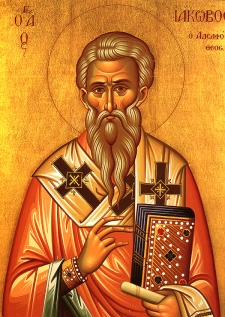Difference between revisions of "Liturgy of St. James"
(→Bibliographical Resources) |
|||
| Line 1: | Line 1: | ||
{{liturgy}} | {{liturgy}} | ||
[[Image:Jamesbrotherlord.jpg|James the Brother of the Lord]] | [[Image:Jamesbrotherlord.jpg|James the Brother of the Lord]] | ||
| − | The '''Divine Liturgy''' of St James is the oldest form of the Eucharist in continuous use. It is the ancient liturgy of the Church of Jerusalem and is attributed to the [[Apostle]] [[James the Just]], the Brother of the Lord | + | The '''Divine Liturgy''' of St James is the oldest form of the Eucharist in continuous use. It is the ancient liturgy of the Church of Jerusalem and is attributed to the [[Apostle]] [[James the Just]], the Brother of the Lord. It is often celebrated in Eastern Orthodox Churches on the feast of St James ([[October 23]]). |
__TOC__ | __TOC__ | ||
| + | |||
| + | ==History of the Liturgy== | ||
| + | The general scholarly consensus is that this liturgy originated in Jerusalem from the late fourth or early fifth century. It quickly became the primary liturgy in Jerusalem in Antioch. Although it was replaced in Jerusalem and Antioch by the [[Liturgy of St Basil]] and the [[Liturgy of St John Chrysostom]], it had already spread to other areas of the Church. The oldest manuscript traditions are in Greek and Syriac, there are also extant manuscripts in Armenian, Ethiopic, and Georgian. | ||
| + | |||
| + | One leading theory today is that of John Fenwick, who argues that the similarities between this liturgy and that of St Basil demonstrates their respective developments of a common source, now lost, but which is best preserved in the Egyptian recension of the Liturgy of St Basil. Fenwick suggests that the Liturgy of St James was composed by St Cyril of Jerusalem c. 370. | ||
| + | |||
| + | Today it is the principal liturgy of the Syriac Orthodox Church, the Syrian Catholic Church, the Indian Orthodox Church, the Syro-Malankara Catholic Church, and the Mar Thoma Church. | ||
==Liturgy of the Catechumens== | ==Liturgy of the Catechumens== | ||
Revision as of 05:22, June 20, 2007
| This article forms part of the series on the Divine Liturgy | |
| Liturgy of the Preparation | |
| Proskomedia Liturgical objects Vestments | |
| Liturgy of the Word | |
| Great Litany Antiphons Little Entrance Troparion Thrice-Holy Hymn Epistle Gospel Homily Litany of Fervent Supplication Litany for the Departed Litany of the Catechumens | |
| Liturgy of the Eucharist | |
| Cherubic Hymn Great Entrance Litany of the Completion Nicene-Constantinopolitan Creed Anaphora Epiclesis Megalynarion Lord's Prayer Communion Dismissal Antidoron | |
| Edit this box | |

The Divine Liturgy of St James is the oldest form of the Eucharist in continuous use. It is the ancient liturgy of the Church of Jerusalem and is attributed to the Apostle James the Just, the Brother of the Lord. It is often celebrated in Eastern Orthodox Churches on the feast of St James (October 23).
Contents
History of the Liturgy
The general scholarly consensus is that this liturgy originated in Jerusalem from the late fourth or early fifth century. It quickly became the primary liturgy in Jerusalem in Antioch. Although it was replaced in Jerusalem and Antioch by the Liturgy of St Basil and the Liturgy of St John Chrysostom, it had already spread to other areas of the Church. The oldest manuscript traditions are in Greek and Syriac, there are also extant manuscripts in Armenian, Ethiopic, and Georgian.
One leading theory today is that of John Fenwick, who argues that the similarities between this liturgy and that of St Basil demonstrates their respective developments of a common source, now lost, but which is best preserved in the Egyptian recension of the Liturgy of St Basil. Fenwick suggests that the Liturgy of St James was composed by St Cyril of Jerusalem c. 370.
Today it is the principal liturgy of the Syriac Orthodox Church, the Syrian Catholic Church, the Indian Orthodox Church, the Syro-Malankara Catholic Church, and the Mar Thoma Church.
Liturgy of the Catechumens
Liturgy of the Faithful
Bibliographical Resources
- The Divine Liturgy of St James (The Monks of New Skete, 1996). ISBN 0935129375.
- John R. K. Fenwick, The Anaphoras of St Basil and St James: An Investigation into Their Common Origin (Orientalia Christiana Analecta, 1992). ISBN 8872102952.
- John D. Witvliet, "Tha Anaphora of St. James," in Paul F. Bradshaw, ed., Essays on Early Eastern Eucharistic Prayers (Pueblo, 1997). ISBN 081466153X.
External Links
- "Divine Liturgy of James the Apostle and Brother of God": brief introduction and e-text as translated by Archimandrite Ephrem Lash.
- Liturgy of St. James in Ante-Nicene Fathers
- Catholic Encyclopedia: Article in The Catholic Encyclopedia on the "Liturgy of Jerusalem"